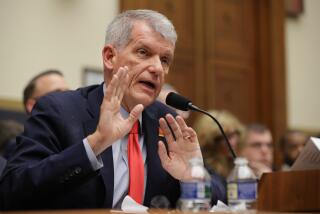Dynegy Asked Ex-Exec to Cook Books, Suit Says
- Share via
HOUSTON — A former Dynegy Inc. executive alleges in a lawsuit that he was fired for refusing to take steps to artificially manipulate profits and losses in 2000.
The suit filed Friday was brought by Bradley Farnsworth, a former senior vice president who served as controller for the Houston energy company. The Securities and Exchange Commission and the U.S. attorney’s office in Houston are investigating Dynegy’s accounting.
Farnsworth, 49, is seeking unspecified damages in the suit, filed Friday in a Texas state court in Houston.
Farnsworth claims he was asked by Steve Bergstrom, Dynegy’s president and chief operating officer, to engage in illegal practices involving accounting of natural gas trading in Britain.
Dynegy spokesman John Sousa said Dynegy is reviewing the lawsuit and intends “to vigorously contest Mr. Farnsworth’s claims.” Because litigation is pending, Sousa said, company policy prevented further comment.
After refusing to take part in the alleged illegal practices, Farnsworth was kept out of routine meetings on earnings and eventually fired, the suit says.
He was fired because “he wouldn’t play ball,” Farnsworth’s lawyer, Philip Hilder, told the Houston Chronicle in Saturday’s editions.
The suit doesn’t allege that Dynegy went through with the manipulation that Farnsworth said he was asked to engage in.
The SEC and the U.S. attorney’s office are probing Dynegy’s Project Alpha, a complex accounting vehicle that boosted reported cash flow and cut taxes with no other obvious purpose.
Asked if his client had talked to the SEC or prosecutors, Hilder said he couldn’t comment.
Farnsworth, hired by Dynegy in 1997, was responsible for day-to-day accounting activities and SEC filings as controller.
In March 2000, the suit says, Farnsworth told Bergstrom he was concerned that Dynegy’s British trading operation had significant “short” positions in both gas and power. Such positions would benefit Dynegy if commodity prices declined.
The suit says he “discussed with Bergstrom the inherent risks involved should prices in both the natural gas and power markets rise simultaneously.”
About a month later, prices for both rose, “resulting in significant financial losses to the company, which violated the company’s established risk limits.” Throughout the summer, losses continued to increase.
In August, the suit says, “Bergstrom specifically asked that the plaintiff ‘shave’ or reduce for accounting purposes” the model used to project gas prices for the period from Oct. 1, 2000, to March 31, 2001.
Doing so would let Dynegy reduce losses, the suit says. The amount involved, Hilder said, would have been “significant.”
More to Read
Inside the business of entertainment
The Wide Shot brings you news, analysis and insights on everything from streaming wars to production — and what it all means for the future.
You may occasionally receive promotional content from the Los Angeles Times.










